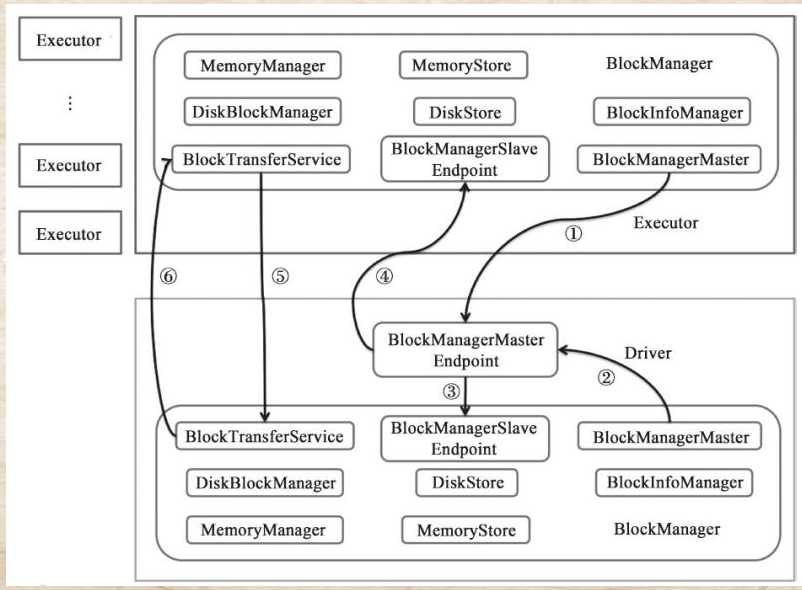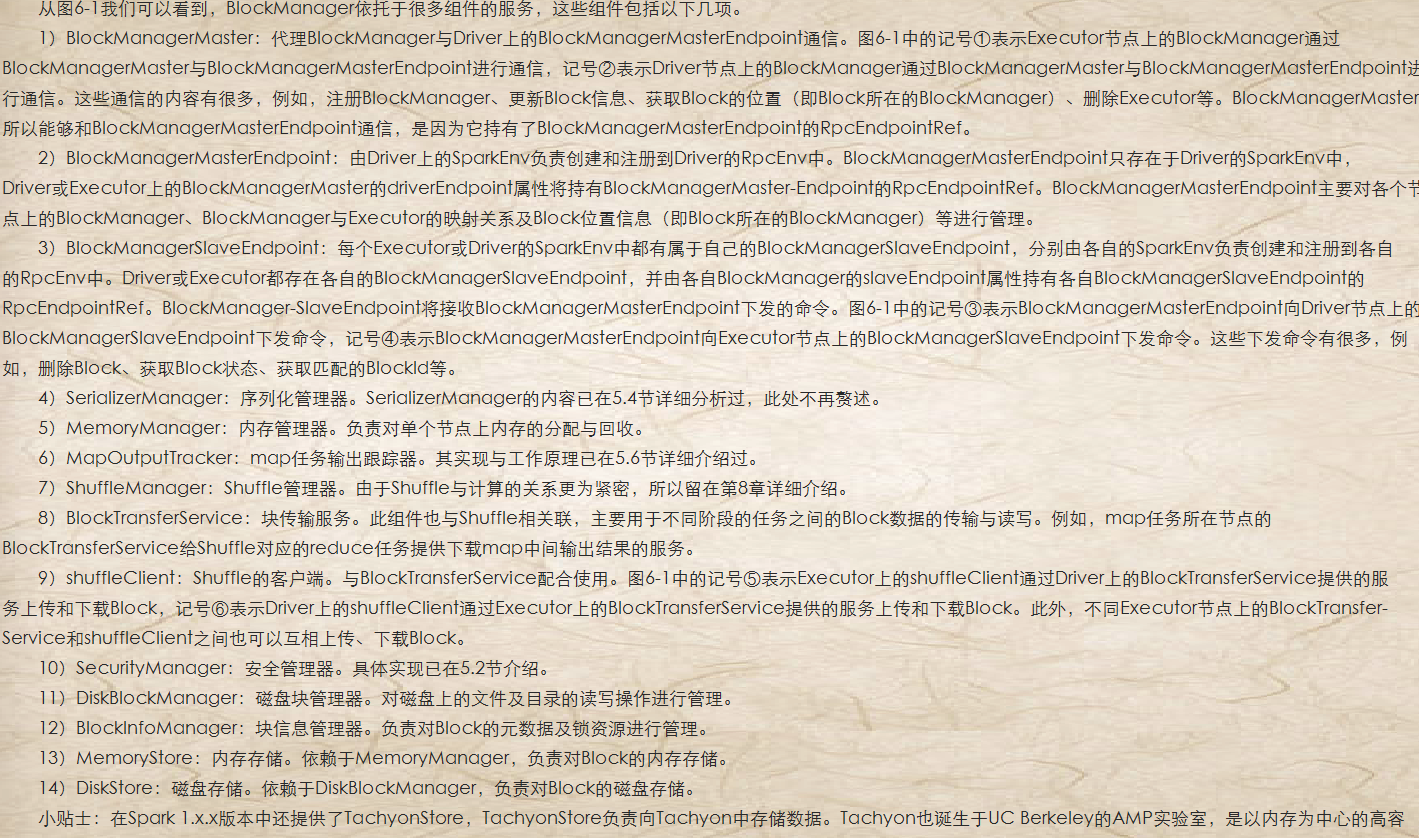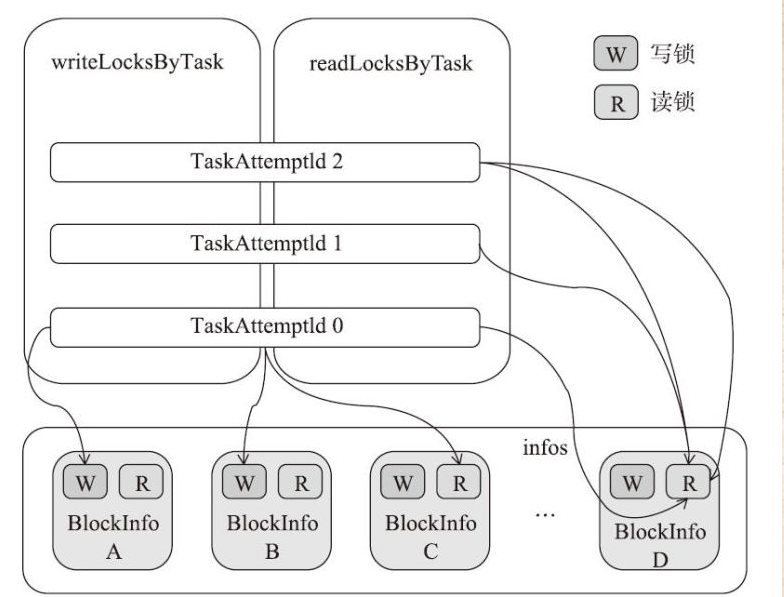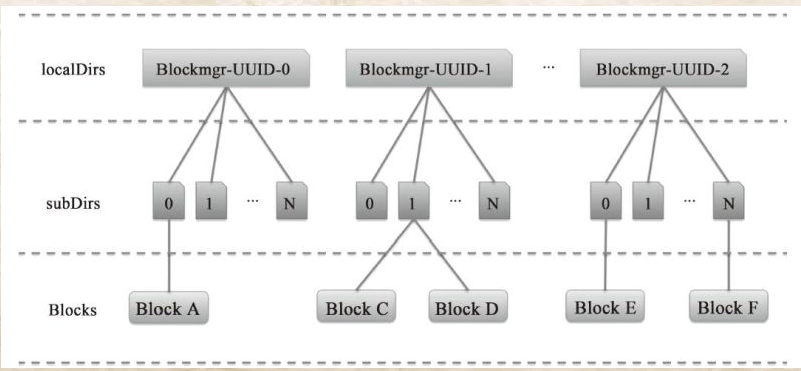6 spark 存储体系
6.1 block存储体系


存储体系架构图

6.2 block 信息信息管理器


6.2.2 bock锁的实现
6.3 磁盘block管理
/* * Licensed to the Apache Software Foundation (ASF) under one or more * contributor license agreements. See the NOTICE file distributed with * this work for additional information regarding copyright ownership. * The ASF licenses this file to You under the Apache License, Version 2.0 * (the "License"); you may not use this file except in compliance with * the License. You may obtain a copy of the License at * * http://www.apache.org/licenses/LICENSE-2.0 * * Unless required by applicable law or agreed to in writing, software * distributed under the License is distributed on an "AS IS" BASIS, * WITHOUT WARRANTIES OR CONDITIONS OF ANY KIND, either express or implied. * See the License for the specific language governing permissions and * limitations under the License. */ package org.apache.spark.storage import javax.annotation.concurrent.GuardedBy import scala.collection.JavaConverters._ import scala.collection.mutable import scala.reflect.ClassTag import com.google.common.collect.{ConcurrentHashMultiset, ImmutableMultiset} import org.apache.spark.{SparkException, TaskContext} import org.apache.spark.internal.Logging /** * Tracks metadata for an individual block. * * Instances of this class are _not_ thread-safe and are protected by locks in the * [[BlockInfoManager]]. * * @param level the block's storage level. This is the requested persistence level, not the * effective storage level of the block (i.e. if this is MEMORY_AND_DISK, then this * does not imply that the block is actually resident in memory). * @param classTag the block's [[ClassTag]], used to select the serializer * @param tellMaster whether state changes for this block should be reported to the master. This * is true for most blocks, but is false for broadcast blocks. */ private[storage] class BlockInfo( val level: StorageLevel, val classTag: ClassTag[_], val tellMaster: Boolean) { /** * The size of the block (in bytes) */ def size: Long = _size def size_=(s: Long): Unit = { _size = s checkInvariants() } private[this] var _size: Long = 0 /** * The number of times that this block has been locked for reading. */ def readerCount: Int = _readerCount def readerCount_=(c: Int): Unit = { _readerCount = c checkInvariants() } private[this] var _readerCount: Int = 0 /** * The task attempt id of the task which currently holds the write lock for this block, or * [[BlockInfo.NON_TASK_WRITER]] if the write lock is held by non-task code, or * [[BlockInfo.NO_WRITER]] if this block is not locked for writing. */ def writerTask: Long = _writerTask def writerTask_=(t: Long): Unit = { _writerTask = t checkInvariants() } private[this] var _writerTask: Long = BlockInfo.NO_WRITER private def checkInvariants(): Unit = { // A block's reader count must be non-negative: assert(_readerCount >= 0) // A block is either locked for reading or for writing, but not for both at the same time: assert(_readerCount == 0 || _writerTask == BlockInfo.NO_WRITER) } checkInvariants() } private[storage] object BlockInfo { /** * Special task attempt id constant used to mark a block's write lock as being unlocked. */ val NO_WRITER: Long = -1 /** * Special task attempt id constant used to mark a block's write lock as being held by * a non-task thread (e.g. by a driver thread or by unit test code). */ val NON_TASK_WRITER: Long = -1024 } /** * Component of the [[BlockManager]] which tracks metadata for blocks and manages block locking. * * The locking interface exposed by this class is readers-writer lock. Every lock acquisition is * automatically associated with a running task and locks are automatically released upon task * completion or failure. * * This class is thread-safe. */ private[storage] class BlockInfoManager extends Logging { private type TaskAttemptId = Long /** * Used to look up metadata for individual blocks. Entries are added to this map via an atomic * set-if-not-exists operation ([[lockNewBlockForWriting()]]) and are removed * by [[removeBlock()]]. */ @GuardedBy("this") private[this] val infos = new mutable.HashMap[BlockId, BlockInfo] /** * Tracks the set of blocks that each task has locked for writing. */ @GuardedBy("this") private[this] val writeLocksByTask = new mutable.HashMap[TaskAttemptId, mutable.Set[BlockId]] with mutable.MultiMap[TaskAttemptId, BlockId] /** * Tracks the set of blocks that each task has locked for reading, along with the number of times * that a block has been locked (since our read locks are re-entrant). */ @GuardedBy("this") private[this] val readLocksByTask = new mutable.HashMap[TaskAttemptId, ConcurrentHashMultiset[BlockId]] // ---------------------------------------------------------------------------------------------- // Initialization for special task attempt ids: registerTask(BlockInfo.NON_TASK_WRITER) // ---------------------------------------------------------------------------------------------- /** * Called at the start of a task in order to register that task with this [[BlockInfoManager]]. * This must be called prior to calling any other BlockInfoManager methods from that task. */ def registerTask(taskAttemptId: TaskAttemptId): Unit = synchronized { require(!readLocksByTask.contains(taskAttemptId), s"Task attempt $taskAttemptId is already registered") readLocksByTask(taskAttemptId) = ConcurrentHashMultiset.create() } /** * Returns the current task's task attempt id (which uniquely identifies the task), or * [[BlockInfo.NON_TASK_WRITER]] if called by a non-task thread. */ private def currentTaskAttemptId: TaskAttemptId = { Option(TaskContext.get()).map(_.taskAttemptId()).getOrElse(BlockInfo.NON_TASK_WRITER) } /** * Lock a block for reading and return its metadata. * * If another task has already locked this block for reading, then the read lock will be * immediately granted to the calling task and its lock count will be incremented. * * If another task has locked this block for writing, then this call will block until the write * lock is released or will return immediately if `blocking = false`. * * A single task can lock a block multiple times for reading, in which case each lock will need * to be released separately. * * @param blockId the block to lock. * @param blocking if true (default), this call will block until the lock is acquired. If false, * this call will return immediately if the lock acquisition fails. * @return None if the block did not exist or was removed (in which case no lock is held), or * Some(BlockInfo) (in which case the block is locked for reading). */ def lockForReading( blockId: BlockId, blocking: Boolean = true): Option[BlockInfo] = synchronized { logTrace(s"Task $currentTaskAttemptId trying to acquire read lock for $blockId") do { infos.get(blockId) match { case None => return None case Some(info) => if (info.writerTask == BlockInfo.NO_WRITER) { info.readerCount += 1 readLocksByTask(currentTaskAttemptId).add(blockId) logTrace(s"Task $currentTaskAttemptId acquired read lock for $blockId") return Some(info) } } if (blocking) { wait() } } while (blocking) None } /** * Lock a block for writing and return its metadata. * * If another task has already locked this block for either reading or writing, then this call * will block until the other locks are released or will return immediately if `blocking = false`. * * @param blockId the block to lock. * @param blocking if true (default), this call will block until the lock is acquired. If false, * this call will return immediately if the lock acquisition fails. * @return None if the block did not exist or was removed (in which case no lock is held), or * Some(BlockInfo) (in which case the block is locked for writing). */ def lockForWriting( blockId: BlockId, blocking: Boolean = true): Option[BlockInfo] = synchronized { logTrace(s"Task $currentTaskAttemptId trying to acquire write lock for $blockId") do { infos.get(blockId) match { case None => return None case Some(info) => if (info.writerTask == BlockInfo.NO_WRITER && info.readerCount == 0) { info.writerTask = currentTaskAttemptId writeLocksByTask.addBinding(currentTaskAttemptId, blockId) logTrace(s"Task $currentTaskAttemptId acquired write lock for $blockId") return Some(info) } } if (blocking) { wait() } } while (blocking) None } /** * Throws an exception if the current task does not hold a write lock on the given block. * Otherwise, returns the block's BlockInfo. */ def assertBlockIsLockedForWriting(blockId: BlockId): BlockInfo = synchronized { infos.get(blockId) match { case Some(info) => if (info.writerTask != currentTaskAttemptId) { throw new SparkException( s"Task $currentTaskAttemptId has not locked block $blockId for writing") } else { info } case None => throw new SparkException(s"Block $blockId does not exist") } } /** * Get a block's metadata without acquiring any locks. This method is only exposed for use by * [[BlockManager.getStatus()]] and should not be called by other code outside of this class. */ private[storage] def get(blockId: BlockId): Option[BlockInfo] = synchronized { infos.get(blockId) } /** * Downgrades an exclusive write lock to a shared read lock. */ def downgradeLock(blockId: BlockId): Unit = synchronized { logTrace(s"Task $currentTaskAttemptId downgrading write lock for $blockId") val info = get(blockId).get require(info.writerTask == currentTaskAttemptId, s"Task $currentTaskAttemptId tried to downgrade a write lock that it does not hold on" + s" block $blockId") unlock(blockId) val lockOutcome = lockForReading(blockId, blocking = false) assert(lockOutcome.isDefined) } /** * Release a lock on the given block. * In case a TaskContext is not propagated properly to all child threads for the task, we fail to * get the TID from TaskContext, so we have to explicitly pass the TID value to release the lock. * * See SPARK-18406 for more discussion of this issue. */ def unlock(blockId: BlockId, taskAttemptId: Option[TaskAttemptId] = None): Unit = synchronized { val taskId = taskAttemptId.getOrElse(currentTaskAttemptId) logTrace(s"Task $taskId releasing lock for $blockId") val info = get(blockId).getOrElse { throw new IllegalStateException(s"Block $blockId not found") } if (info.writerTask != BlockInfo.NO_WRITER) { info.writerTask = BlockInfo.NO_WRITER writeLocksByTask.removeBinding(taskId, blockId) } else { assert(info.readerCount > 0, s"Block $blockId is not locked for reading") info.readerCount -= 1 val countsForTask = readLocksByTask(taskId) val newPinCountForTask: Int = countsForTask.remove(blockId, 1) - 1 assert(newPinCountForTask >= 0, s"Task $taskId release lock on block $blockId more times than it acquired it") } notifyAll() } /** * Attempt to acquire the appropriate lock for writing a new block. * * This enforces the first-writer-wins semantics. If we are the first to write the block, * then just go ahead and acquire the write lock. Otherwise, if another thread is already * writing the block, then we wait for the write to finish before acquiring the read lock. * * @return true if the block did not already exist, false otherwise. If this returns false, then * a read lock on the existing block will be held. If this returns true, a write lock on * the new block will be held. */ def lockNewBlockForWriting( blockId: BlockId, newBlockInfo: BlockInfo): Boolean = synchronized { logTrace(s"Task $currentTaskAttemptId trying to put $blockId") lockForReading(blockId) match { case Some(info) => // Block already exists. This could happen if another thread races with us to compute // the same block. In this case, just keep the read lock and return. false case None => // Block does not yet exist or is removed, so we are free to acquire the write lock infos(blockId) = newBlockInfo lockForWriting(blockId) true } } /** * Release all lock held by the given task, clearing that task's pin bookkeeping * structures and updating the global pin counts. This method should be called at the * end of a task (either by a task completion handler or in `TaskRunner.run()`). * * @return the ids of blocks whose pins were released */ def releaseAllLocksForTask(taskAttemptId: TaskAttemptId): Seq[BlockId] = synchronized { val blocksWithReleasedLocks = mutable.ArrayBuffer[BlockId]() val readLocks = readLocksByTask.remove(taskAttemptId).getOrElse(ImmutableMultiset.of[BlockId]()) val writeLocks = writeLocksByTask.remove(taskAttemptId).getOrElse(Seq.empty) for (blockId <- writeLocks) { infos.get(blockId).foreach { info => assert(info.writerTask == taskAttemptId) info.writerTask = BlockInfo.NO_WRITER } blocksWithReleasedLocks += blockId } readLocks.entrySet().iterator().asScala.foreach { entry => val blockId = entry.getElement val lockCount = entry.getCount blocksWithReleasedLocks += blockId get(blockId).foreach { info => info.readerCount -= lockCount assert(info.readerCount >= 0) } } notifyAll() blocksWithReleasedLocks } /** Returns the number of locks held by the given task. Used only for testing. */ private[storage] def getTaskLockCount(taskAttemptId: TaskAttemptId): Int = { readLocksByTask.get(taskAttemptId).map(_.size()).getOrElse(0) + writeLocksByTask.get(taskAttemptId).map(_.size).getOrElse(0) } /** * Returns the number of blocks tracked. */ def size: Int = synchronized { infos.size } /** * Return the number of map entries in this pin counter's internal data structures. * This is used in unit tests in order to detect memory leaks. */ private[storage] def getNumberOfMapEntries: Long = synchronized { size + readLocksByTask.size + readLocksByTask.map(_._2.size()).sum + writeLocksByTask.size + writeLocksByTask.map(_._2.size).sum } /** * Returns an iterator over a snapshot of all blocks' metadata. Note that the individual entries * in this iterator are mutable and thus may reflect blocks that are deleted while the iterator * is being traversed. */ def entries: Iterator[(BlockId, BlockInfo)] = synchronized { infos.toArray.toIterator } /** * Removes the given block and releases the write lock on it. * * This can only be called while holding a write lock on the given block. */ def removeBlock(blockId: BlockId): Unit = synchronized { logTrace(s"Task $currentTaskAttemptId trying to remove block $blockId") infos.get(blockId) match { case Some(blockInfo) => if (blockInfo.writerTask != currentTaskAttemptId) { throw new IllegalStateException( s"Task $currentTaskAttemptId called remove() on block $blockId without a write lock") } else { infos.remove(blockId) blockInfo.readerCount = 0 blockInfo.writerTask = BlockInfo.NO_WRITER writeLocksByTask.removeBinding(currentTaskAttemptId, blockId) } case None => throw new IllegalArgumentException( s"Task $currentTaskAttemptId called remove() on non-existent block $blockId") } notifyAll() } /** * Delete all state. Called during shutdown. */ def clear(): Unit = synchronized { infos.valuesIterator.foreach { blockInfo => blockInfo.readerCount = 0 blockInfo.writerTask = BlockInfo.NO_WRITER } infos.clear() readLocksByTask.clear() writeLocksByTask.clear() notifyAll() } }






